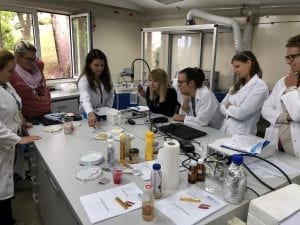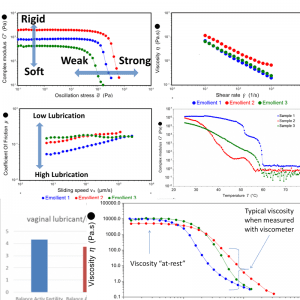This rheology training program is aimed at providing personnel with the lexicon, concepts and practical tools required to exploit the benefits of rheological testing of a range of product types and to confidently communicate findings with management and colleagues.
The course typically lasts a single day but content, breadth and depth can be modified to suit to the customer’s requirements.
If you would like to arrange a call to discuss a rheology training program for yourself and/or your colleagues, please feel welcome to contact us.
Practical Rheology Training Part 1: Thinking like a Rheologist – An Accessible Foundation for a Wide Audience
 In this training session we will introduce participants to the key principles of rheology. Intended for both rheometer users and recipients of rheology data, who need to communicate their requirements and interpret results. The session kicks off with a “messy play” where a range of everyday products that span the landscape of observed and important rheological properties are handled and thought-provoking questions are posed. This element of the training has proved to be highly-effective at challenging preconceptions about material types and establishing the mind-set of the successful practical rheologist.
In this training session we will introduce participants to the key principles of rheology. Intended for both rheometer users and recipients of rheology data, who need to communicate their requirements and interpret results. The session kicks off with a “messy play” where a range of everyday products that span the landscape of observed and important rheological properties are handled and thought-provoking questions are posed. This element of the training has proved to be highly-effective at challenging preconceptions about material types and establishing the mind-set of the successful practical rheologist.
The training session introduces:
- A simple landscape on which solids, liquids and everything in-between can be laid out.
- Structured liquids and elastic liquids: Everyday examples showing behaviour that we all recognise.
- Viscosity and non-Newtonian liquids
- Structure and viscoelasticity: What does it mean to say that a thickened liquid is actually, in many cases, a soft-solid?
- How do we describe and quantify structured liquids and elastic liquids.
Practical Rheology Training Part 2: The Rheologist’s Toolkit- Methods for Characterising Relevant Properties of Interest
 This part of the training course combines theory presentations and practical work at the rheometer, covering the core knowledge and test method development necessary for rheometer users to confidently select and perform testing and interpret and communicate results.
This part of the training course combines theory presentations and practical work at the rheometer, covering the core knowledge and test method development necessary for rheometer users to confidently select and perform testing and interpret and communicate results.
The training session covers:
- Shear vs extensional deformation: The relative importance of either.
- Definitions:
- Strain, Shear stress and shear rate
- Viscosity and modulus
- Structure, yield stress and thixotropy
- The Rheologist’s Toolkit of Test Metrics and Methods
- Viscosity profiling
- Shear stress vs shear rate methods
- Zero-shear viscosity and the anatomy of the flow curve
- Oscillatory testing methods for elasticity and structure
- Stress, strain and frequency sweeps
- A simple explanation of G’, G” and tan δ and how we use them
- Using the toolkit: What is the thought process when a new sample needs testing?
- Using rheology to:
- Predict handling properties
- Track the impact of formulation changes
- Benchmark a marketplace and compare to competitor products
- Compare batches for scale-up and process development activities
- Better understand stability
On completion of the course a three month support period commences during which participants are free to ask as many questions as they wish, share rheology data for review or discuss any new sample testing challenges. This follow on support is provided by web-meeting, email or phone.
